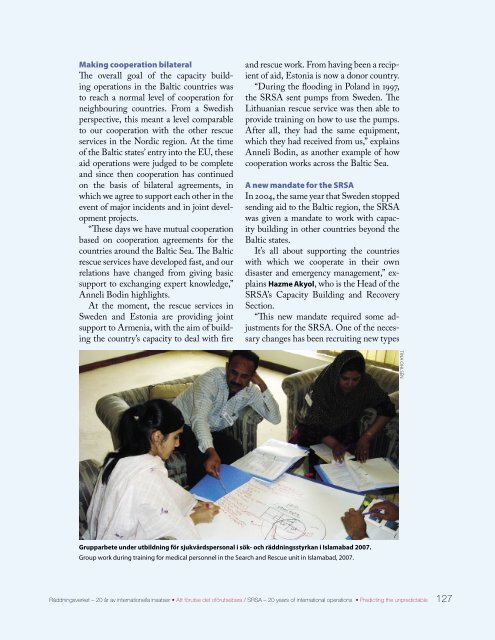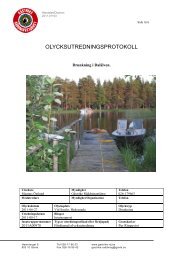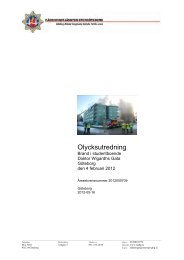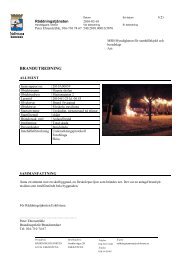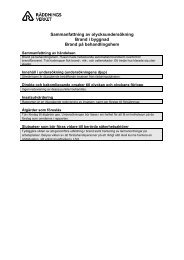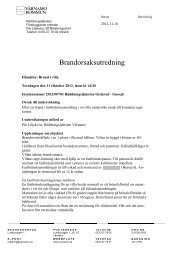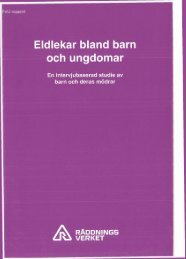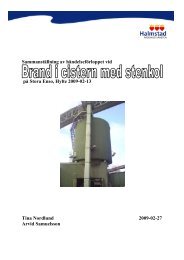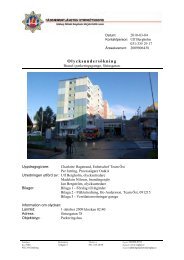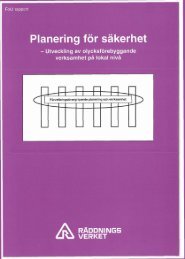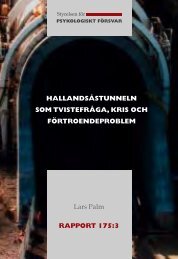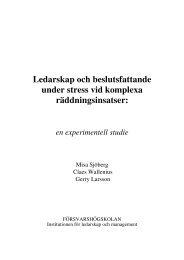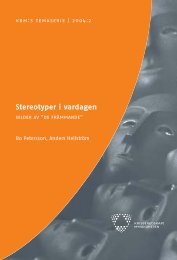20 år av internationella insatser - Myndigheten för samhällsskydd ...
20 år av internationella insatser - Myndigheten för samhällsskydd ...
20 år av internationella insatser - Myndigheten för samhällsskydd ...
Create successful ePaper yourself
Turn your PDF publications into a flip-book with our unique Google optimized e-Paper software.
Making cooperation bilateral<br />
The overall goal of the capacity building<br />
operations in the Baltic countries was<br />
to reach a normal level of cooperation for<br />
neighbouring countries. From a Swedish<br />
perspective, this meant a level comparable<br />
to our cooperation with the other rescue<br />
services in the Nordic region. At the time<br />
of the Baltic states’ entry into the EU, these<br />
aid operations were judged to be complete<br />
and since then cooperation has continued<br />
on the basis of bilateral agreements, in<br />
which we agree to support each other in the<br />
event of major incidents and in joint development<br />
projects.<br />
“These days we h<strong>av</strong>e mutual cooperation<br />
based on cooperation agreements for the<br />
countries around the Baltic Sea. The Baltic<br />
rescue services h<strong>av</strong>e developed fast, and our<br />
relations h<strong>av</strong>e changed from giving basic<br />
support to exchanging expert knowledge,”<br />
Anneli Bodin highlights.<br />
At the moment, the rescue services in<br />
Sweden and Estonia are providing joint<br />
support to Armenia, with the aim of building<br />
the country’s capacity to deal with fire<br />
and rescue work. From h<strong>av</strong>ing been a recipient<br />
of aid, Estonia is now a donor country.<br />
“During the flooding in Poland in 1997,<br />
the SRSA sent pumps from Sweden. The<br />
Lithuanian rescue service was then able to<br />
provide training on how to use the pumps.<br />
After all, they had the same equipment,<br />
which they had received from us,” explains<br />
Anneli Bodin, as another example of how<br />
cooperation works across the Baltic Sea.<br />
A new mandate for the SRSA<br />
In <strong>20</strong>04, the same year that Sweden stopped<br />
sending aid to the Baltic region, the SRSA<br />
was given a mandate to work with capacity<br />
building in other countries beyond the<br />
Baltic states.<br />
It’s all about supporting the countries<br />
with which we cooperate in their own<br />
disaster and emergency management,” explains<br />
Hazme Akyol, who is the Head of the<br />
SRSA’s Capacity Building and Recovery<br />
Section.<br />
“This new mandate required some adjustments<br />
for the SRSA. One of the necessary<br />
changes has been recruiting new types<br />
TINA OHLSÉN<br />
Grupparbete under utbildning för sjukvårdspersonal i sök- och räddningsstyrkan i Islamabad <strong>20</strong>07.<br />
Group work during training for medical personnel in the Search and Rescue unit in Islamabad, <strong>20</strong>07.<br />
Räddningsverket – <strong>20</strong> år <strong>av</strong> <strong>internationella</strong> <strong>insatser</strong> • Att förutse det oförutsebara / SRSA – <strong>20</strong> years of international operations • Predicting the unpredictable 127


